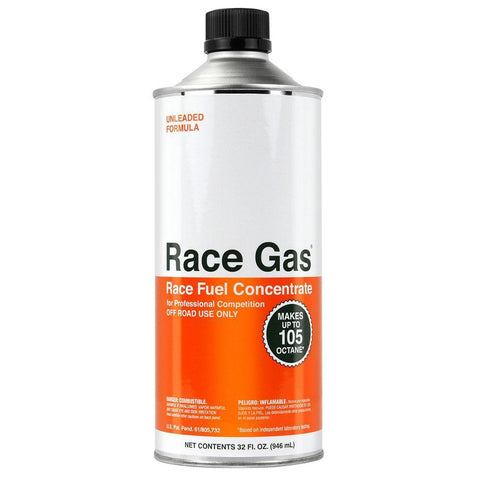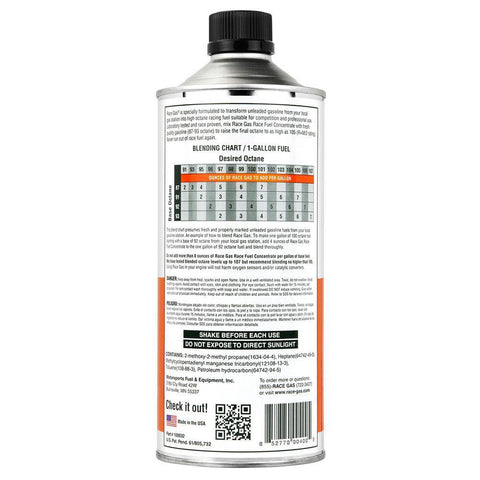

Race Gas Race Fuel Concentrate - up to 105 Octane | 32oz. Bottle
Give us a call to get the best prices and parts for your build. Or, just call us with a cool racing story...either way we're here.
Phone Call or Text 651-927-4510
Email - sales@maperformance.com
Call Or Text Our Experts at 651-927-4510
*SEE DETAILS
Race Gas Concentrate
When blended to the proper ratio, RACE GAS can take your ordinary pump gasoline and transform it into high octane, high energy, track grade racing fuel. RACE GAS will keep you from ever running out of racing fuel.
In working with several chemists and our suppliers we came up with the blend that became RACE GAS. When we had a third party laboratory run the ASTM D 2699 and 2700 tests, Race Gas blended with pump gas produced results as good as racing with regularly distilled 100 octane gasoline, See the test results. This blend will improve the quality of regular "pump gas" and make it suitable for racing - why? Because RACE GAS adds back in the key elements of racing fuel - hydrocarbons, oxygenates, and organometallic compounds:
- Fuel Hydrocarbons: Fuel Hydrocarbons are compounds that contain both Carbon and Hydrogen that, when burned, produce water (H2O) or Carbon Dioxide (CO2). Saturated Hydrocarbons have a high octane rating and carry additional carbon atoms which produce more energy when burned. They also produce a synergistic effect when used with certain organometallic compounds to product higher octane ratings than if they are used by themselves.
- Oxygenates are one of the most misunderstood compounds in gasoline. While many have heard of the negative effects of oxygenates like Ethanol and Methanol not all oxygenates are created equal. Oxygenates play a very important role in high octane gasoline. Like the name suggests oxygenates add oxygen to gasoline. As we all know our engines need oxygen to burn fuel. By adding an oxygenate to RACE GASTM we are adding that crucial oxygen to the fuel which, in turn, allows the engine to burn fuel more completely thereby taking advantage of the additional carbon atoms added by the fuel hydrocarbons. The net result is more horsepower! The oxygenates that are used in Race Gas are not derived from alcohol like methanol and ethanol and therefor do not damage fuel system and engine components like these oxygenates do.
- Organometallic compounds are added to gasoline to increase the octane of the fuel. Up until recently Tetra Ethyl Lead was used in gasoline for this purpose. In addition lead was used as a lubricant on older engines that didn't have hardened valve seats. The problem with lead in gasoline, (other than the environmental effects), was the fact that scavenger compounds needed to be added to gas in order to keep the lead from creating deposits on pistons and cylinder heads. When the EPA banned lead in fuel refiners turned to other metallic compounds like Manganese, Iron, Nickel and Magnesium. All of these different compounds have their pros and cons. We believe that Manganese has the best overall effect on octane and the best synergistic effect with the other compounds in Race Gas. As a result Race Gas contains high quality Methylcyclopentadienyl Manganese Tricarbonyl or MMT.
Moreover, we know that RACE GAS is safe for cars even under the most demanding conditions. We have burned RACE GAS in everything from a 944 Turbo race car, a modified Audi TT, a Hemi Magnum, a Hemi Challenger, and modified VW R32, a Corvette and many other cars. All showed increases in power, throttle response and torque.
Features
- Make up to 105 Octane with Race Gas
Applications
- Universal
What's In The Box?
- (1) Can of Race Gas Concentrate
Warranty
- Manufacturer Standard Warranty
Definitely notice a difference in my engine performance. "Woke" the motor up. 12:1 n/a LS7.
Downside is it's pretty expensive. Two cans in a 20 gallon tank and you already spent $65 before you pump any gas.
This stuff is awesome!! I mainly use it in my dirt bike amd its great! Used it a few time in my cousins drag car and worked great too. Way cheaper to buy this and mix your own race gas than buy it at the track
I own a 1965 Chevrolet Impala 396 Super Sport and the engine was changed out to a 454 quarter inch stroker 496ci with aluminum GM performance heads and popup pistons. The compression ratio is 12.5 to 1 and Premium pump gas doesn’t cut it. On any given day I can't open the secondary's or it would ping like crazy and I’d have to back off the throttle. The timing was backed way off to help prevent detonation, but then the engine runs hot and power suffers.
I started with just 1 ounce per gallon and worked good at initial timing setting of 4 degrees BTDC, no detonation. I upped the anti and added 2 ounces per gallon and cranked the initial timing up to 8 degrees BTDC and adjusted total advance to 52 degrees BTDC. This thing is a rocket ship on the freeway and still no detonation!! I used a not so accurate measurement method, but it works well enough to test general performance improvement. My son and I used a iPhone timer and the Impala speedo to time 50 mph to 100 mph. We got less than 5 seconds. Picked up almost 1 full second from before adding Race Gas and bumbing up the timing! Way fun and not bad for a 4000lb car!
Note: this is a street car I don't race it - 3 speed Turbo 400 with .308 gears.
Works as supposed to very pleased
Race gas increase my pump gas 91....the car goes from 12.08 to 12.01 in the 1/4 mille in Las Vegas motor speedway.

